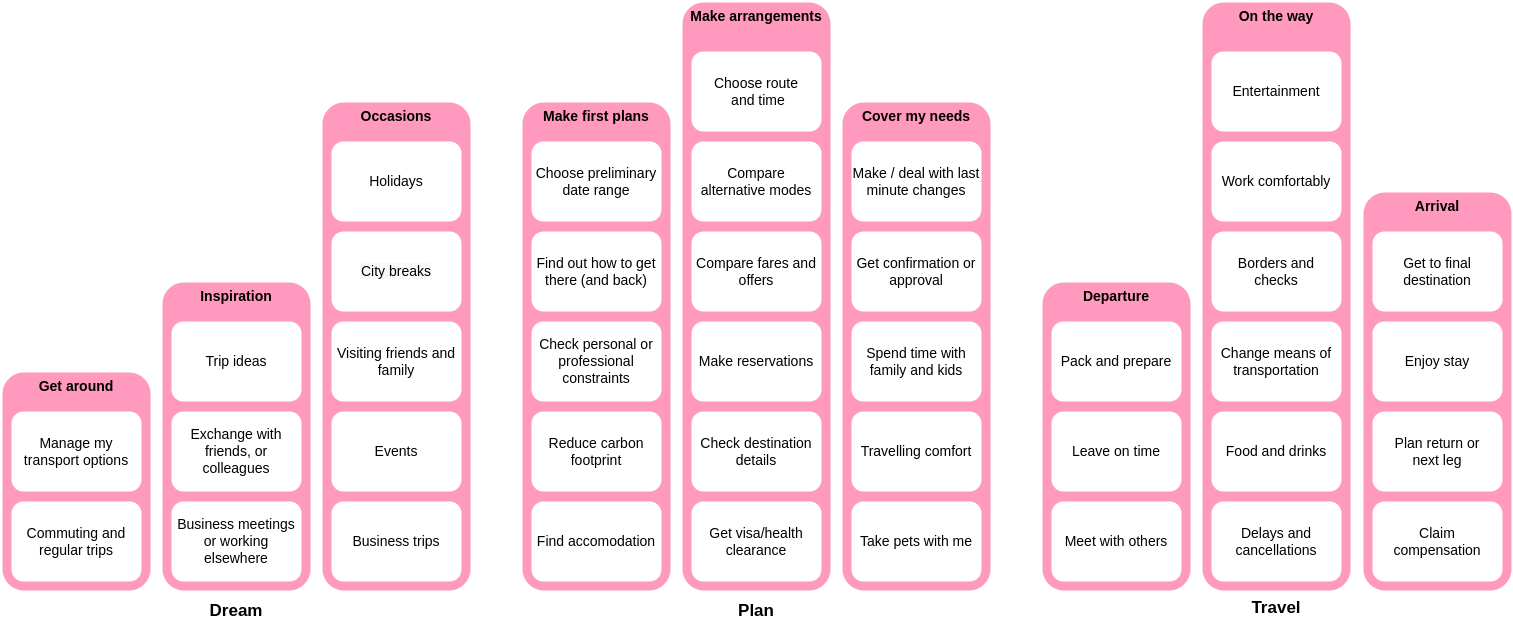No edit summary |
|||
| (8 intermediate revisions by the same user not shown) | |||
| Line 1: | Line 1: | ||
<small>[[Enterprise Elements]] | [[Facet and Intersection Elements]] | {{element|Ex Icon-Experience|Experience}}</small> | |||
={{element|Ex Element-Task|Task}}= | |||
<span class="Ex Def">What people want to achieve and get done.</span> | |||
==Description== | ==Description== | ||
People have numerous tasks they want to accomplish every day: getting | [[People]] have numerous tasks they want to accomplish every day: getting up in the morning, working together with a colleague, visiting a friend or relaxing in the evening. Those tasks are about the [[outcomes]] people want to achieve, not the means to get there. Tasks can be seen as a stable expression of people's needs, motivations and intent. | ||
up in the morning, working together with a colleague, visiting a friend or | |||
relaxing in the evening. Those tasks are about the outcomes people want | [[Enterprises]] appear in people's [[experiences]] as [[brands]] offering [[products]] to help them accomplish their tasks as they go through their [[journeys]]. A coffee shop, a train company or a video streaming service all offer solutions to serve the tasks mentioned before. | ||
to achieve, not the means to get there. Tasks can be seen as a stable | |||
expression of | Achieving clarity on people's tasks, ideally backed by evidence through research, offers our enterprise a chance to focus on people's most important needs and motivations. This provides opportunities for products to make a difference by making valuable offerings to [[customers]]. It also helps with understanding the needs of [[employees]], partners or other important people and can be used for the design of job roles or partnership offerings. This helps our enterprise improve the role it plays in people's lives. | ||
==Task Map== | |||
[[File:EDGY-Task-Map_Job-Map_Mental-Model-Diagram.png|EDGY Task Map / Job Map / Mental Model diagram]] | |||
Depicting a [[tree]] relationship. Also known as Job Map or Mental Model diagram (see [[References#Literature|references]]). | |||
==Examples== | ==Examples== | ||
| Line 32: | Line 26: | ||
==Use== | ==Use== | ||
*When deciding which products to create and market, tasks clarify what these products are for. | *When deciding which [[products]] to create and market, tasks clarify what these products are for. | ||
*Gain insight and a sense of priority about what matters to customers or other important people. | *Gain insight and a sense of priority about what matters to [[customers]] or other important [[people]]. | ||
*Clarify what people interact with us for. | *Clarify what people interact with us for. | ||
*Explore the motivations underlying needs to help discover unmet needs not explicitly mentioned by people. | *Explore the motivations underlying needs to help discover unmet needs not explicitly mentioned by people. | ||
==Related== | ==Base element== | ||
*{{ | *{{element|Ex Element-Task|task}} is an {{element|Element-Outcome|outcome}} | ||
*{{ | |||
*{{ | ==Related== | ||
*{{ | *{{element|Pr Element-Product|product}} serves {{element|Ex Element-Task|task}} | ||
*{{element|Br Element-Brand|brand}} supports {{element|Ex Element-Task|task}} | |||
*{{element|Ex Element-Task|task}} is part of {{element|Ex Element-Journey|journey}} | |||
*{{element|Ex Element-Task|task}} uses {{element|Ex Element-Channel|channel}} | |||
==Suggested Labels== | |||
*[[Task (functional)|functional]], [[Task (social)|social]], [[Task (emotional)|emotional]] ([[tagging|tag]]) | |||
*satisfaction ([[metric]]) | |||
= | {{#seo: | ||
|keywords=EDGY,Task Map,Job Map,Mental Model Diagram,Jobs-to-be-Done,Top Tasks | |||
|description=In EDGY, a task is what people want to achieve and get done. EDGY is Intersection Group's Open Source tool for collaborative Enterprise Design. | |||
|image=EDGY-Task-Map_Job-Map_Mental-Model-Diagram.png | |||
|image_alt=EDGY Task Map | |||
}} | |||
Latest revision as of 18:46, 8 June 2023
Enterprise Elements | Facet and Intersection Elements | Experience
Task
What people want to achieve and get done.
Description
People have numerous tasks they want to accomplish every day: getting up in the morning, working together with a colleague, visiting a friend or relaxing in the evening. Those tasks are about the outcomes people want to achieve, not the means to get there. Tasks can be seen as a stable expression of people's needs, motivations and intent.
Enterprises appear in people's experiences as brands offering products to help them accomplish their tasks as they go through their journeys. A coffee shop, a train company or a video streaming service all offer solutions to serve the tasks mentioned before.
Achieving clarity on people's tasks, ideally backed by evidence through research, offers our enterprise a chance to focus on people's most important needs and motivations. This provides opportunities for products to make a difference by making valuable offerings to customers. It also helps with understanding the needs of employees, partners or other important people and can be used for the design of job roles or partnership offerings. This helps our enterprise improve the role it plays in people's lives.
Task Map
Depicting a tree relationship. Also known as Job Map or Mental Model diagram (see references).
Examples
- A private investor compares the financial performance of various stocks.
- A person experiences symptoms of a potential sickness and contacts a public healthcare service.
- An airline official looks up current delays to inform passengers waiting at the airport.
- A customer checks their insurance coverage before starting the procedure to file a claim.
- A company founder subscribes to a dating app to find a spouse.
Use
- When deciding which products to create and market, tasks clarify what these products are for.
- Gain insight and a sense of priority about what matters to customers or other important people.
- Clarify what people interact with us for.
- Explore the motivations underlying needs to help discover unmet needs not explicitly mentioned by people.
Base element
Related
Suggested Labels
- functional, social, emotional (tag)
- satisfaction (metric)
